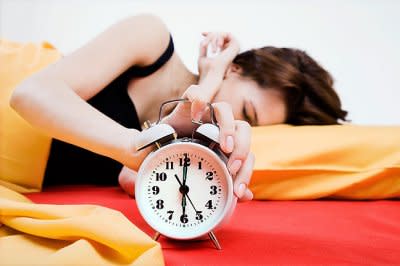How Daylight Savings Can Affect Your Health

When Europe first enacted Daylight Savings Time in 1916, the goal was not more or less sleep, or longer farming days as is popularly believed; it was to conserve expensive coal burning during World War I by maximizing daylight during laboring hours.
After much of the rest of the world followed suite with the twice yearly clock change that became known as "Spring forward, Fall back," effects began to emerge-among them, factors that can even affect how you look and feel.
Beauty Advantages When You Fall Back:
Circadian Rhythms - Your Body Clock
When Daylight Savings Time ends in the fall, experts say the body returns to its intrinsic circadian rhythm, which synchs up with natural sunlight changes throughout the year. As a result, we're more likely to sleep soundly during the fall and winter, but are less likely to do so in the leap forward during spring and summer.
In short, our bodies aren't fooled by the artificial change in time. Car crash statistics support the theory: history has shown that the week after the spring clock change, there's a statistically significant increase in car accidents, which YouBeauty Sleep Expert James Maas, Ph.D. says is partly due to sleep deprivation. "Reaction time is slowed, motor skills suffer and cognitive awareness is dulled. You are accident-prone," says Maas.
QUIZ: How are Your Sleep Habits?
Appetite Control
Extended sunlight hours in the spring and summer can signal to the body that it should be awake and eating, while more darkness in the fall and winter can help control natural appetite urges, since the body is instead preparing to rest. The tendency towards longer and better hours of sleep in the winter can also help you lose weight (if you can navigate the holiday parties without binge eating).
"Experts estimate that compared to getting seven to eight hours per night, the risk of developing obesity rises 23 percent with just six hours of sleep per night, 50 percent with only five hours of sleep per night, and 73 percent with four hours per night," says nutritionist Keri Glassman, R.D., C.D.N.
STUDY: Lack of Sleep Leads to Snacking
Beauty Advantages When You Spring Forward:
Beautiful Skin
Vitamin D is an antioxidant that not only aids calcium absorption, but helps regulate the immune system and is essential to healthy, luminous skin. In order to maintain the recommended level of vitamin D, adults need about 30 minutes of unprotected sun exposure a week to stimulate the body into producing the nutrient.
Currently, 61 percent of US adults are classified as deficient in the antioxidant, according to the National Health and Nutrition Examination Survey (NHANES). When clocks fall back, many don't leave the office or day job until after it's dark. "If people are working inside all day, they're not receiving their daily intake," says New York dermatologist Dennis Gross, M.D. "Vitamin D replenishes skin hydration, boosts elasticity, radiance and luminosity, stimulates collagen and helps smooth the appearance of fine lines and wrinkles," adds Gross-who sells self-tanning towelettes that deliver an activated form of the vitamin to skin. You can also find vitamin D in supplements, fortified milk and soy milk and cereals, though Gross says nutritional additives still need sunlight to activate.
MORE: Your Guide to Supplements
Immune System Strength
More hours of natural sunlight could be good for your immune system, and even strengthen your defense against cancer. In a study by the U.S. National Cancer Institute (NCI), researchers found that excessive amounts of time spent in front of electric light during dark hours can lower the body's resistance against breast cancer.
In the findings, experts observed that artificial light interrupted the flow of melatonin levels in the body, which is essential to sleep and a healthy functioning immune system. "Melatonin is a hormone that is one of the body's most powerful antioxidants-it provides the body with a natural way to repair oxidative damage," says Glassman, of the process that experts believe causes both internal and external aging. Want light without the ill health effects? Enjoy soothing candlelight, which hasn't been shown to affect melatonin levels.
COLUMN: All About Melatonin, by Dr. Oz & Dr. Roizen
Workout Safety
If you enjoy keeping in shape by burning calories outdoors-say with running, walking, biking and blading -your safety is at greater risk when clocks fall back. According to the Insurance Institute for Highway Safety, the fall transition to earlier darkness hours causes a 300 percent uptick in fatal crashes between drivers and pedestrians. Experts attribute the spike to the simple fact that it's more difficult to see people in the road after dark. Statistical incidences increase with more evening rush hour drivers on dark roads that would otherwise be lit with sunlight in the spring and summer.
MORE: Are You Working Out Right?
Your Mood
Seasonal Affective Disorder (SAD) has been publicized in recent years as an all-encompassing diagnosis for anyone feeling depressed once it gets dark earlier, but experts say you shouldn't be so quick to jump to that conclusion. "Often people attribute their lack of energy or depressed mood to decreased sunlight, when it may instead be due to the fact that they're more likely to stay indoors during the winter, get less exercise and sleep more," says behavioral psychologist Mary C. Lamia, Ph.D. Indeed, while sleep is key for preventing depression, too much sleep (regularly more than eight hours a night) is linked with depressive symptoms.
"In those cases, going outside and getting exercise regardless of rain, snow or cold is essential to one's psychological wellbeing," continues Lamia. True SAD diagnoses are usually considered branches of Bipolar Disorder or Major Depressive Disorder, and should be evaluated by a licensed physician.
